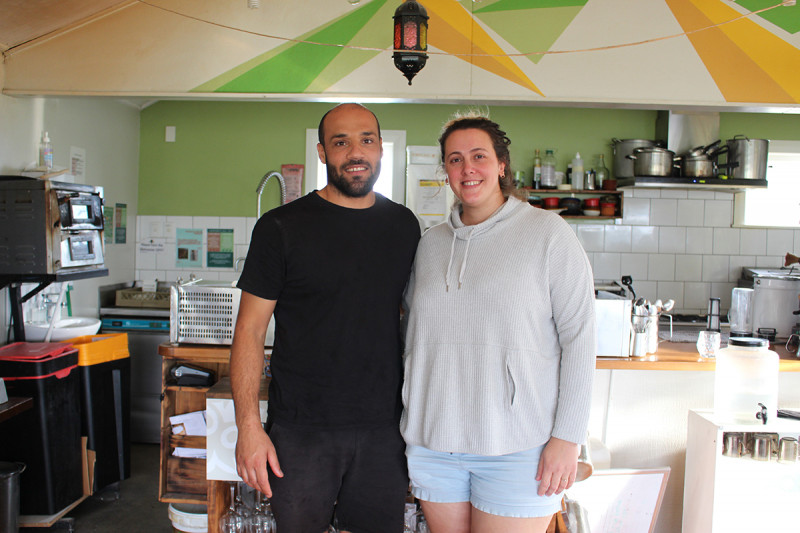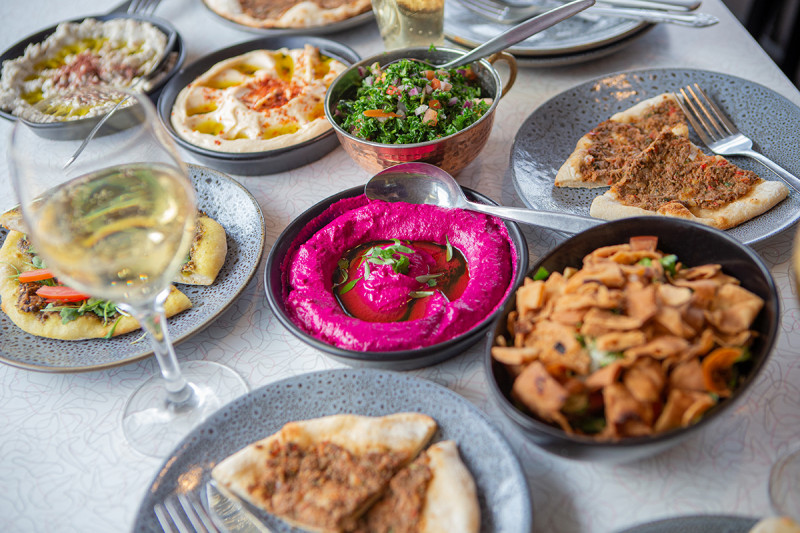

Chefs of Wellington: Hasan Alwarhani and Flora Quintana by Alessia Belsito-Riera
In our Chefs of Wellington series, we talk to the chefs behind some of our favourite local restaurants. Alessia Belsito-Riera chats to Hasan Alwarhani and Flora Quintana of Syrian eatery Damascus, located in the Vogelmorn Bowling Club in Brooklyn.
Can you tell me a bit about your upbringings and how you developed an interest in food?
Hasan: My name is Hasan, I come from Syria, from a city called Swaida. Food is in our culture. We cook at home on a daily basis, we rarely buy things from outside. I come from a farm family so we always eat things that we grow ourselves and things in season. My mum and my sister have always been my teachers. In 2008 I left Syria to go to the UAE. I realised the only way I could connect with home was with food. I was on the phone with my mum or my sister to ask them for recipes and they taught me about techniques and this and that. I met Flora in 2011 and in 2013 we came to New Zealand. I enjoy hosting people and cooking for them and then seeing their reaction. It's amazing. In 2017 we decided to start Damascus as a food truck. We started with manakeesh, like a Middle Eastern pizza. In 2018, we started looking for a commercial place because in the beginning we certified our kitchen from home. Then we found this place. They asked me to do a community dinner and I think I threw myself in the deep end just because I really love cooking. It's something that I have so much passion for but I was just missing the experience. In 2019 we started Damascus here. And that was amazing, [it] definitely changed my life. It gives me so much confidence. It's an open kitchen, you can see people and people can see you, you interact with people. What I always felt since we started Damascus is that I have the massive responsibility that I'm presenting a cuisine. It's really important that it’s exactly how we have it at home. I have that responsibility because since 2010 when you Google or even ask people about Syria the first thing they know is the war and it was always important to me, for people to remember Syria before the war. I just want to show that we love families, we have a very huge culture. For us [Damascus] is like making food for your family, like getting people together around a table.
Flora: I studied to be a chef for two years in Argentina. Then I worked in pastry, because I like it more. I went to Dubai and worked in a few places and then I got a work visa [for here]. This is not new to me, even though it's Hasan’s type of cuisine. At the markets both of us used to cook, doing the fillings and the bread and all these kinds of things. I always wanted to make cakes and sell them so when Hasan came up with the idea of Damascus, I wanted to do Middle Eastern sweets. I took, for example, the crème brûlée and I gave it a twist with orange blossom and rosewater, and people really love it.
Why did you choose to move to New Zealand?
Flora: We were in Dubai and we were thinking that no matter what we do, we will never be appreciated because you work and you never get to be a resident and everything felt too expensive to open a business or have a family. With the working holiday [visa], I'm talking about probably 10 years ago, it was much easier to get visas. I knew [someone] working in the Argentinian embassy so she told me about this Argentinian lady that was opening a café and was looking for a pastry chef that could do Argentinian sweets here in Wellington. I got a visa really fast and I applied for a partnership with Hasan but because he’s Syrian it took him seven months.
Hasan: I straight away honestly fell in love with it. With Wellington, with the people. There are not many places that the people still care or want to have connections.
Flora: We travelled a lot when we first came here but we feel like there's nothing like Wellington.
Is food very important for both of your cultures?
Flora: Yes. I have memories of my grandma cooking and I was doing dishes when I was really young. Every Sunday we would get together and have a massive lunch. My granddad used to do this tomato sauce so then my dad made it and then he passed me the recipe. I'm really lucky, and this is not common in Argentina, that both of my parents cook really good. So for us it’s important. For [Hasan] it’s really important as well.
Do you two ever blend your two cultures with your food?
Flora: We don't really have something that's specifically Argentinian. We’re Italian and Spanish descendants, we have some German and Polish but our main type of cuisine is Spanish and Italian food. We have a really big community that is Syrian and Lebanese. Even myself, my great grandmother from my dad’s side was from Syria.
Hasan: It would be interesting combining Italian with Middle Eastern, because I feel like with Middle Eastern food there are, at least with the hot stuff, similarities with Italian [cuisine]. The Romans [occupied] Syria for hundreds of years so they probably brought something with them.
Flora: And I think that in a similar way for example, we have empanadas and they have something similar, which is what we do at the restaurant which they call manakeesh but it's open, so it's basically the same concept.
So you’ve found similarities within your cultures’ foods?
Flora: Not the same exact flavours but yes. I don't think we tried to mix them but for me personally I like to keep it original.
Hasan: That's why I say that I feel like I have so much responsibility about the culture and the food. How it’s presented, what kind of flavour. For me it's really important to keep it that way.
What about cooking excites you?
Flora: For me, I like the face of the people when they're eating, to see their reaction. And obviously, the finished product. And also, this is for everything, but achieving it. It makes you even prouder of what we are, what we have achieved, how far we we’ve come. We started with no money, we didn’t have family or friends, so it's really emotional to think how we started. Being here and having the support of the community and customers is crazy.
Hasan: We are an open kitchen. Seeing people, and after they finish eating they come and say, ‘that was outstanding, this is amazing’. You definitely feed on that, that gives you motivation, gives you the push to want to do more. I have a really good connection with food, I enjoy doing things from scratch, I try not to buy anything that's ready to use. We do everything in-house, without any nasty stuff and feeding people from your heart puts a smile on their faces. If I go eat Italian or Asian, I feel like in my mind I'm actually there, you get the experience. This gives me motivation, makes me love cooking more and more.
What makes the food here at Damascus so unique?
Hasan: I focus mainly on techniques, how the food is actually done at home and trying to cook it exactly the same way with the same kind of materials. When you cook hummus for example, it takes about six hours for the chickpeas to cook. Plus I learned along the way about spices, and how you combine spices together. Flavour is what makes us unique.
On your website, you emphasise non-GMO, additive-free, and quality ingredients. Why is this such an important element to your dishes?
Hasan: We want to give people a good experience and we want people to eat healthy food. Like I said, we cook at home all the time, so we'll make everything from scratch. My idea was to give the same experience to people.
Flora: It doesn't taste the same if you freeze something. Hasan was really focused on the flavour to taste the same way as if eating back home and mum made it. It pays off but it requires way more work. For example, I make the ice cream, and I'm not using any chemicals, it's just milk, egg yolks, and whatever flavour, and we don't have an ice cream freezer or the chemical to make the ice cream stay smooth, but we like that concept. For me you wouldn’t give the customers something you wouldn’t eat yourself.
Hasan: I feel more confident and proud serving someone knowing that I’m happy about the ingredients I am serving. It’s also what makes us unique. The food is really healthy.
On your website you also mention the importance of being faithful to your ancestors’ traditions. What does this mean to you and how do you fulfil this promise?
Hasan: For me it’s how I’m presenting us back home in a new culture and different country. It means so much to me when people say [they] had a really good time. For me it’s keeping the culture alive [and] giving people a new experience. Staying with our roots is really important for us. Giving people a good experience that makes my country and my family proud of what we are achieving here.
View more articles from:
« Issue 175, July 5, 2022

